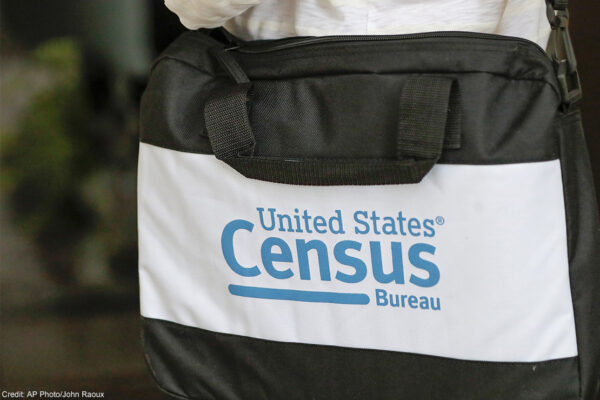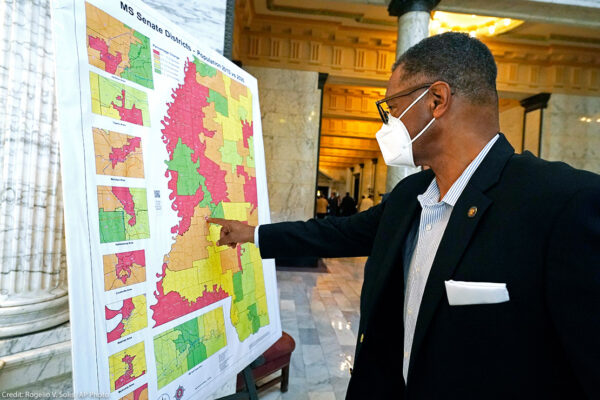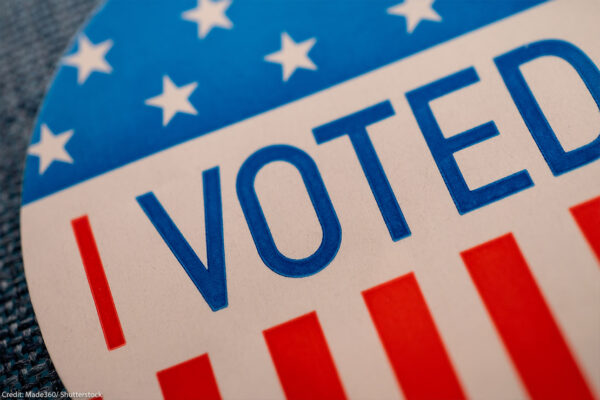Supreme Court Term 2025-2026
We’re breaking down the cases we've asked the court to consider this term.
Latest Case Updates
Ongoing
Updated January 26, 2026
Ongoing
Updated January 16, 2026
Ongoing
Updated January 16, 2026
Ongoing
Updated January 9, 2026
Featured
Missouri
Feb 2026

Voting Rights
Missouri v. U.S. Department of Commerce
A coalition of civil rights and immigrant-rights organizations has moved to intervene as defendants in a lawsuit that threatens to dismantle the Constitution‚Äôs long-standing requirement that the decennial census count all people living in the United States. Missouri asks the court to exclude undocumented immigrants and people living in the country on temporary visas from the census count used to determine congressional representation‚ÄĒan unprecedented move that would upend more than two centuries of constitutional practice.
Mississippi
Dec 2025

Voting Rights
White v. Mississippi State Board of Elections
District lines used to elect Mississippi’s Supreme Court have gone unchanged for more than 35 years. We’re suing because the current lines crack the Mississippi Delta and dilute the voting strength of Black Mississippians in state Supreme Court elections, in violation of the Voting Rights Act.
Court Case
Dec 2025

National Security
Human Rights
FOIA Case Seeking the Trump Administration’s Legal Justification for Deadly Boat Strikes
The Department of Justice‚Äôs Office of Legal Counsel (‚ÄúOLC‚ÄĚ) authored a legal opinion that reportedly claims to justify the Trump administration‚Äôs illegal lethal strikes on civilians in boats in the Caribbean Sea and eastern Pacific Ocean. Media reports indicate that, in addition to claiming that the strikes are lawful acts in an alleged ‚Äúarmed conflict‚ÄĚ with unspecified drug cartels, the OLC opinion also purports to immunize personnel who authorized or took part in the strikes from future criminal prosecution. Because the public deserves to know how our government is justifying these illegal strikes, and why they think the people who carried them out should not be held accountable, the ļž–” ”∆Ķ is seeking immediate release of the OLC legal opinion and related documents pursuant to the Freedom of Information Act.
U.S. Supreme Court
Dec 2025

Immigrants' Rights
Barbara v. Donald J. Trump
President Trump is attempting to undermine the promise of birthright citizenship to children born on U.S. soil. But the ļž–” ”∆Ķ and partners are fighting to protect the rights of citizens that are plainly stated in the Constitution, federal statute, and reaffirmed by the Supreme Court for more than a century. We‚Äôre arguing against the Trump administration in the Supreme Court and are confident we will win.
U.S. Supreme Court
Nov 2025

Voting Rights
Racial Justice
Allen v. Milligan
Whether Alabama’s congressional districts violate Section 2 of the Voting Rights Act because they discriminate against Black voters. We succeeded in winning a new map for 2024 elections which, for the first time, has two congressional district that provide Black voters a fair opportunity to elect candidates of their choosing despite multiple attempts by Alabama to stop us at the Supreme Court. Despite this win, Alabama is still defending its discriminatory map, and a trial was held in February 2025 to determine the map for the rest of the decade.
In May 2025, a federal court ruled that Alabama's 2023 congressional map both violates Section 2 of the Voting Rights Act and was enacted by the Alabama Legislature with racially discriminatory intent.
Washington, D.C.
Oct 2025

Voting Rights
League of Women Voters Education Fund v. Trump
On March 25, 2025, in a sweeping and unprecedented Executive Order, President Trump attempted to usurp the power to regulate federal elections from Congress and the States. Among other things, the Executive Order directs the Election Assistance Commission‚ÄĒan agency that Congress specifically established to be bipartisan and independent‚ÄĒto require voters to show a passport or other citizenship documentation in order to register to vote in federal elections. If implemented, the Executive Order would threaten the ability of millions of eligible Americans to register and vote and upend the administration of federal elections.
On behalf of leading voter registration organizations and advocacy organizations, the ļž–” ”∆Ķ and co-counsel filed a lawsuit to block the Executive Order as an unconstitutional power grab.
U.S. Supreme Court
Oct 2025

Voting Rights
State Board of Election Commissioners v. Mississippi State Conference of the NAACP
Mississippi has a growing Black population, which is already the largest Black population percentage of any state in the country. Yet. Black Mississippians continue to be significantly under-represented in the state legislature, as Mississippi’s latest districting maps fail to reflect the reality of the state’s changing demographics. During the 2022 redistricting process, the Mississippi legislature refused to create any new districts where Black voters have a chance to elect their preferred representative. The current district lines therefore dilute the voting power of Black Mississippians and continue to deprive them of political representation that is responsive to their needs and concerns, including severe disparities in education and healthcare.
U.S. Supreme Court
Oct 2025

Voting Rights
Louisiana v. Callais (Callais v. Landry)
Whether the congressional map Louisiana adopted to cure a Voting Rights Act violation in Robinson v. Ardoin is itself unlawful as a gerrymander.
Missouri
Sep 2025

Voting Rights
Wise v. Missouri
In unprecedented fashion, the State of Missouri has redrawn the district lines used for electing members of Congress for a second time this decade. These new district lines are gerrymandered and will harm political representation for all Missourians, particularly Black residents in Kansas City, who have been divided along racial lines.
All Cases
1,675 Court Cases

Court Case
Feb 2025
Immigrants' Rights
ļž–” ”∆Ķ FOIA Suit for ICE‚Äôs Updated Solitary Confinement Policy
ICE’s use of special management units, or solitary confinement, has prompted active concern and attention from Congress, the media, and advocates. On Dec. 6, 2024, ICE announced that it had issued policy updates for the use of special management units (SMU), or solitary confinement cells, for detained immigrants. ICE, however, has not made a copy of the updated policy publicly available. We’ve sued to obtain a copy of this policy to better defend immigrants subject to solitary confinement in detention.
Explore case
Court Case
Feb 2025

Immigrants' Rights
ļž–” ”∆Ķ FOIA Suit for ICE‚Äôs Updated Solitary Confinement Policy
ICE’s use of special management units, or solitary confinement, has prompted active concern and attention from Congress, the media, and advocates. On Dec. 6, 2024, ICE announced that it had issued policy updates for the use of special management units (SMU), or solitary confinement cells, for detained immigrants. ICE, however, has not made a copy of the updated policy publicly available. We’ve sued to obtain a copy of this policy to better defend immigrants subject to solitary confinement in detention.

Court Case
Feb 2025
Immigrants' Rights
RAICES v. Noem
Immigrants’ rights advocates sued the Trump administration over the president’s recent proclamation aimed at completely shutting down asylum at the border, a move that puts thousands of lives at risk.
Explore case
Court Case
Feb 2025

Immigrants' Rights
RAICES v. Noem
Immigrants’ rights advocates sued the Trump administration over the president’s recent proclamation aimed at completely shutting down asylum at the border, a move that puts thousands of lives at risk.

Washington, D.C.
Feb 2025
Immigrants' Rights
Refugee and Immigrant Center for Education and Legal Services v. Kristi Noem
Explore case
Washington, D.C.
Feb 2025

Immigrants' Rights
Refugee and Immigrant Center for Education and Legal Services v. Kristi Noem

Oregon Supreme Court
Feb 2025
Prisoners' Rights
Huskey v. Oregon Department of Corrections
This case in the Oregon Supreme Court centers on whether Article I, Section 41(3) of the Oregon Constitution, which provides that Oregon prisoners lack legally enforceable rights to prison jobs and training, bars prisoners from collecting damages relating to lost prison jobs and training caused by the alleged breach of a settlement agreement by prison officials. The ļž–” ”∆Ķ‚Äôs State Supreme Court Initiative, alongside the ļž–” ”∆Ķ of Oregon, filed an amicus brief arguing that plaintiff Arnold Huskey, an incarcerated individual whose identity was used in Department of Corrections training materials, is entitled to damages notwithstanding Article I, Section 41(3), because plaintiffs in contract disputes never have to show standalone legal rights to the damages they claim. Instead, they need only show that the damages were reasonably foreseeable consequences of the alleged breach of contract.
Explore case
Oregon Supreme Court
Feb 2025

Prisoners' Rights
Huskey v. Oregon Department of Corrections
This case in the Oregon Supreme Court centers on whether Article I, Section 41(3) of the Oregon Constitution, which provides that Oregon prisoners lack legally enforceable rights to prison jobs and training, bars prisoners from collecting damages relating to lost prison jobs and training caused by the alleged breach of a settlement agreement by prison officials. The ļž–” ”∆Ķ‚Äôs State Supreme Court Initiative, alongside the ļž–” ”∆Ķ of Oregon, filed an amicus brief arguing that plaintiff Arnold Huskey, an incarcerated individual whose identity was used in Department of Corrections training materials, is entitled to damages notwithstanding Article I, Section 41(3), because plaintiffs in contract disputes never have to show standalone legal rights to the damages they claim. Instead, they need only show that the damages were reasonably foreseeable consequences of the alleged breach of contract.

Utah Supreme Court
Jan 2025
Capital Punishment
Menzies v. Utah Department of Corrections
Article I, section 9 of the Utah Constitution protects incarcerated individuals from both cruel and unusual punishment and unnecessarily rigorous treatment. This case asks whether death-sentenced plaintiffs seeking to challenge certain execution methods as cruel and unusual or unnecessarily rigorous under this provision must identify, in their pleadings, an alternative method of execution. The U.S. Supreme Court has required this alternative for Eighth Amendment challenges, but the ļž–” ”∆Ķ‚Äôs State Supreme Court Initiative, alongside the Capital Punishment Project and ļž–” ”∆Ķ of Utah, filed an amicus brief in support of the plaintiffs, arguing that federal caselaw does not limit the greater protections provided by section 9 of the Utah Constitution. Forcing prisoners challenging a method of execution to identify an acceptable alternative method is cruel, coercive, and not necessary to the administration of Utah‚Äôs death penalty laws.
Explore case
Utah Supreme Court
Jan 2025

Capital Punishment
Menzies v. Utah Department of Corrections
Article I, section 9 of the Utah Constitution protects incarcerated individuals from both cruel and unusual punishment and unnecessarily rigorous treatment. This case asks whether death-sentenced plaintiffs seeking to challenge certain execution methods as cruel and unusual or unnecessarily rigorous under this provision must identify, in their pleadings, an alternative method of execution. The U.S. Supreme Court has required this alternative for Eighth Amendment challenges, but the ļž–” ”∆Ķ‚Äôs State Supreme Court Initiative, alongside the Capital Punishment Project and ļž–” ”∆Ķ of Utah, filed an amicus brief in support of the plaintiffs, arguing that federal caselaw does not limit the greater protections provided by section 9 of the Utah Constitution. Forcing prisoners challenging a method of execution to identify an acceptable alternative method is cruel, coercive, and not necessary to the administration of Utah‚Äôs death penalty laws.
